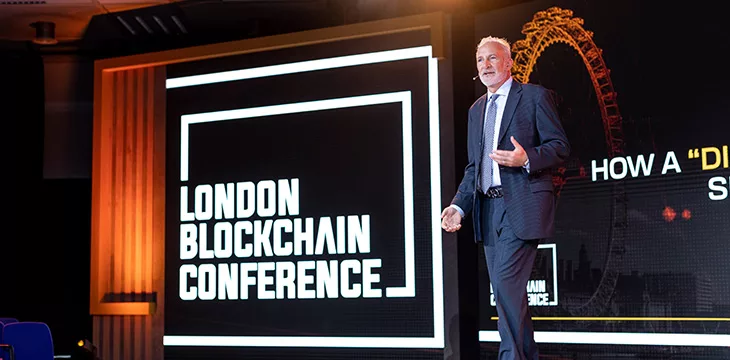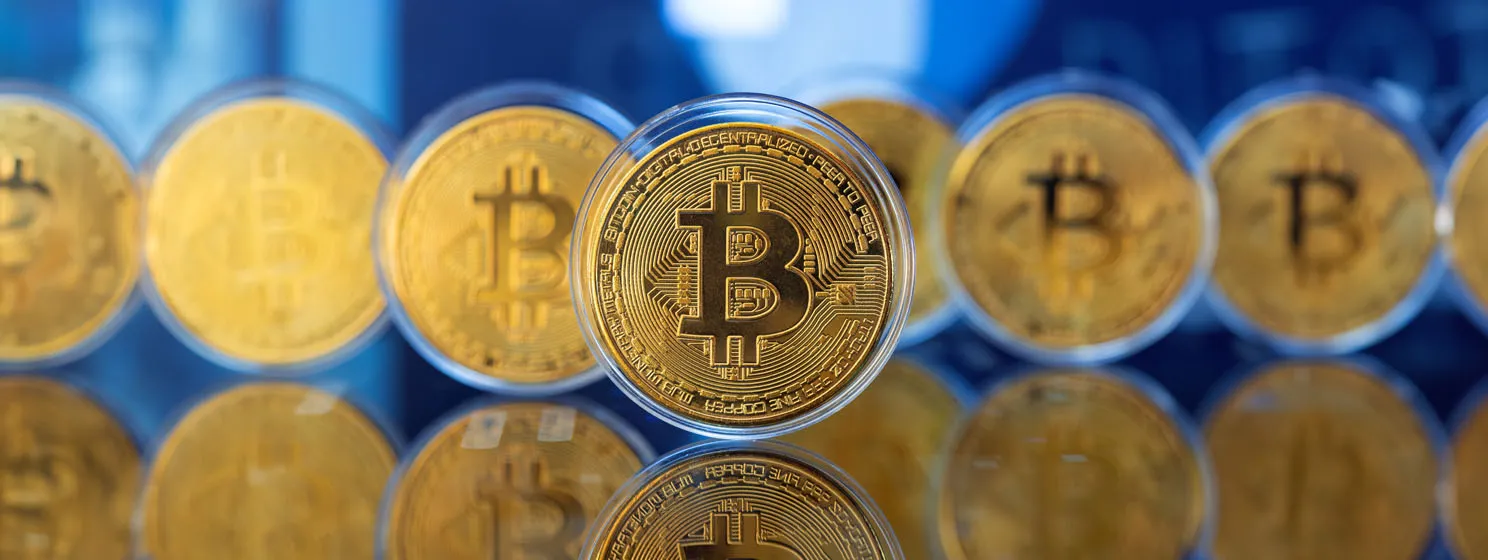|
Getting your Trinity Audio player ready...
|
Gold bugs and “sound money” enthusiasts flocked to economist Peter Schiff’s talk at the recent London Blockchain Conference (LBC). He once again raised the prospect of a blockchain-based, gold-backed digital currency, one that has particular appeal in our era of high inflation and out-of-control deficit spending. To get some answers to the question, “why doesn’t this exist already?”, CoinGeek spoke to Eli Afram, the entrepreneur who created the company Amleh, who explained why the BSV blockchain could make all the difference.
After @KurtWuckertJr spoke with @PeterSchiff, @CalvinAyre had a quick discussion with Peter about how #BSV is designed to integrate with #IPv6 and be the backbone of the future of the Internet, because of unbounded scale and frictionless transactions 👀#LDNBlockchain23 pic.twitter.com/q0zA1ba2ac
— CoinGeek (@RealCoinGeek) June 6, 2023
Schiff’s idea isn’t new, but his high profile and large user base are again shining a spotlight on the idea. Following his recent statements on the topic and his presentation at the 2023 London Blockchain Conference, there were plenty of gold bugs and blockchain entrepreneurs with a special interest in digital gold tokens lining up to chat with him.
Afram was among those. “I attended the conference primarily to listen to Peter Schiff, whose viewpoints I have been following for some time,” he said.
Bitcoin, sound money, and gold
In its early days, Bitcoin attracted much attention from precious metals fans and fiat-money critics who followed Peter Schiff’s commentary and/or the Austrian Economics school (full confession: I was one of them). Though there are many subsets of this group, many are interested in the notion that only gold and silver can be “real money” due to their physical properties and millennia-long status in human societies and that the limited availability of these physical metals acts as a check against government over-spending and inflation. With its finite 21 million-coin and immutable transaction records, Bitcoin seemed similar while being more suited to modern commerce.
Some still say Bitcoin units themselves are “digital gold,” though that argument has flaws. When it became known that blockchain tokens could represent other assets, either through marked UTXOs or smart contracts, the argument arose again—why can’t we use the blockchain to create our own sound, gold-backed currency?
In fact, the concept of digital token surrogates for static gold reserves pre-dates Bitcoin by at least a decade. Projects like Liberty Reserve and e-gold used similar principles, and Neal Stephenson’s “Cryptonomicon” describes a fictional 1990s attempt to create a digital currency backed by a WWII-era gold stash.
So, with blockchain’s superior and more transparent record-keeping technology and the partial acceptance of “stablecoin” assets from regulators and the public, a genuine gold-backed digital token could become a reality.
However, there’s a lot more to building an actual, token-based digital gold network than simply coming up with the idea and coding its front- and back-ends. As Afram himself replied to a question about Amleh’s current status: “Product is built; it needs vaults and gold.”
Obtaining enough gold to back a widely-used currency network is a challenge, as is building and securing the vaults required to keep it. The popular expression “locked up like Fort Knox” exists for a good reason, and there are questions over whether any entity with resources smaller than a major multinational corporation or nation-state could pull it off.
There are also the issues of trust and network effect that impact all blockchain projects—your digital currency might work, but how many people know about it, and can they depend on it existing for a long time?
These challenges haven’t stopped anyone from trying, and in fact there are already several examples in the blockchain world. As Afram noted, though, the technological limits of the most widely-known blockchain platforms have presented all the usual hurdles like high transaction fees, and their inability to scale.
Afram and his partners launched Amleh a few years ago, with development work from Elas in Australia. Its white paper, which you can read here, describes the system’s structure and how it works. Meanwhile, read the interview below to hear more about how the Amleh project has progressed, and whether Peter Schiff’s recent statements could finally make tokenized digital gold a reality.
What is the present progress of the Amleh project?
The Amleh software product is complete, and we’ve showcased it to several potential investors and partners. Yet, we are still in the process of securing a deal with a gold company. Fundamentally, Amleh is software, but the other crucial element is the asset, gold in this case. Successful projects like Amleh rely on partnerships as they blend digital solutions with physical assets to create something new—in this case, a novel iteration of gold, which we refer to as Gold 2.0.
Given that gold-backed blockchain tokens are a recurring topic of interest among both early and present Bitcoiners, including Dr. Craig Wright, why hasn’t it been fully realized yet?
Indeed, some companies and vaults have developed gold-backed tokens. However, these tokens have been built on platforms like Ethereum and other non-scalable systems, which are plagued with high fees, making them impractical. At the London Blockchain Conference, Schiff emphasized that although governments had undermined fiat currency by detaching it from gold, he believes the private sector would reintroduce gold as a currency via projects like Amleh. To my knowledge, we’re the first to tokenize gold in a way that eliminates friction and enables its use as money.
Investors may be hesitant due to the stigma around blockchain, linked to scams and illegal activities. Yet, anyone who explores our product will quickly see that we value legal compliance and complete transparency.
Were you able to have a conversation with Peter Schiff at the London Bitcoin Conference after his presentation?
Yes, indeed. I attended the conference primarily to listen to Schiff, whose viewpoints I have been following for some time. I found his talk insightful and agreed with many of his points. I managed to briefly introduce him to the Amleh project after his talk, and we had another short conversation later that night. My goal was to ensure that he was aware of who I was and what our product was about. As expected, he was tentatively open, which is a standard response for high-profile individuals like Schiff, who are frequently approached with a wide range of proposals. I have recently reached out to him via email and am hopeful about demonstrating the product.
Is there anything else you’d like to mention?
Amleh is MUCH more than just a token platform. As mentioned in my recent tweet:
The Amleh Gold platform uses a Metanet based hierarchical model to help companies establish and manage their own digital gold vaults into system, and stake their own gold.#gold #blockchain #bsv pic.twitter.com/x76vGLBfi6
— Eli Afram (@justicemate) June 11, 2023
It is a metanet-enabled solution that enables numerous companies and vaults to issue their own gold into the system. As long as they all agree to the terms that the root authority sets, they can then use the platform to manage their own digital vaults and control the staking and issuance of tokens into the system. Essentially then, it is a company management system, it is a vault management system, and it is a gold management system. The idea is actually novel and versatile enough to be made to fit into any model needed.
Watch: Peter Schiff discuss Gold as a commodity

 07-02-2025
07-02-2025 





